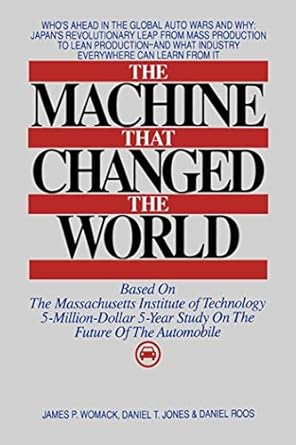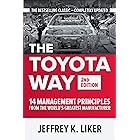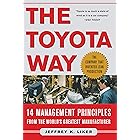| Print List Price: | $19.99 |
| Kindle Price: | $15.99 Save $4.00 (20%) |
| Sold by: | Simon and Schuster Digital Sales LLC Price set by seller. |
Your Memberships & Subscriptions

Download the free Kindle app and start reading Kindle books instantly on your smartphone, tablet, or computer - no Kindle device required.
Read instantly on your browser with Kindle for Web.
Using your mobile phone camera - scan the code below and download the Kindle app.

OK
 Audible sample Sample
Audible sample Sample 


The Machine That Changed the World: The Story of Lean Production-- Toyota's Secret Weapon in the Global Car Wars That Is Now Revolutionizing World Industry ... That Is Revolutionizing World Industry) 1st Edition, Kindle Edition
When The Machine That Changed the World was first published in 1990, Toyota was half the size of General Motors. Twenty years later Toyota passed GM as the world’s largest auto maker. This management classic was the first book to reveal Toyota’s lean production system that is the basis for its enduring success.
Authors Womack, Jones, and Roos provided a comprehensive description of the entire lean system. They exhaustively documented its advantages over the mass production model pioneered by General Motors and predicted that lean production would eventually triumph. Indeed, they argued that it would triumph not just in manufacturing but in every value-creating activity from health care to retail to distribution.
Today The Machine That Changed the World provides enduring and essential guidance to managers and leaders in every industry seeking to transform traditional enterprises into exemplars of lean success.
- ISBN-109781416554523
- ISBN-13978-0743299794
- Edition1st
- PublisherFree Press
- Publication dateMarch 13, 2007
- LanguageEnglish
- File size6225 KB
Customers who bought this item also bought
Editorial Reviews
From Library Journal
- Joseph Barth, U.S. Military Acad. Lib., West Point, N.Y.
Copyright 1990 Reed Business Information, Inc.
Review
"The fundamentals of this system are applicable to every industry across the globe...[and] will have a profound impact on human societyit will truly change the world." -- New York Times Magazine
About the Author
Daniel T. Jones is the chairman and founder of the Lean Enterprise Academy (www.leanuk.org), a nonprofit education and research organization based in the UK.
Excerpt. © Reprinted by permission. All rights reserved.
Chapter 1
THE INDUSTRY OF INDUSTRIES IN TRANSITION
Forty years ago Peter Drucker dubbed it "the industry of industries." Today, automobile manufacturing is still the world's largest manufacturing activity, with nearly 50 million new vehicles produced each year.
Most of us own one, many of us own several, and, although we may be unaware of it, these cars and trucks are an important part of our everyday lives.
Yet the auto industry is even more important to us than it appears. Twice in this century it has changed our most fundamental ideas of how we make things. And how we make things dictates not only how we work but what we buy, how we think, and the way we live.
After World War I, Henry Ford and General Motors' Alfred Sloan moved world manufacture from centuries of craft production -- led by European firms -- into the age of mass production. Largely as a result, the United States soon dominated the global economy.
After World War II, Eiji Toyoda and Taiichi Ohno at the Toyota Motor Company in Japan pioneered the concept of lean production. The rise of Japan to its current economic preeminence quickly followed, as other Japanese companies and industries copied this remarkable system.
Manufacturers around the world are now trying to embrace lean production, but they're finding the going rough. The companies that first mastered this system were all headquartered in one country -- Japan. As lean production has spread to North America and Western Europe under their aegis, trade wars and growing resistance to foreign investment have followed.
Today, we hear constantly that the world faces a massive overcapacity crisis -- estimated by some industry executives at more than 8 million units in excess of current world sales of about 50 million units. This is, in fact, a misnomer. The world has an acute shortage of competitive lean-production capacity and a vast glut of uncompetitive mass-production capacity. The crisis is caused by the former threatening the latter.
Many Western companies now understand lean production, and at least one is well along the path to introducing it. However, superimposing lean-production methods on existing mass-production systems causes great pain and dislocation. In the absence of a crisis threatening the very survival of the company, only limited progress seems to be possible.
General Motors is the most striking example. This gigantic company is still the world's largest industrial concern and was without doubt the best at mass production, a system it helped to create. Now, in the age of lean production, it finds itself with too many managers, too many workers, and too many plants. Yet GM has not yet faced a life-or-death crisis, as the Ford Motor Company did in the early 1980s, and thus it has not been able to change.
This book is an effort to ease the necessary transition from mass production to lean. By focusing on the global auto industry, we explain in simple, concrete terms what lean production is, where it came from, how it really works, and how it can spread to all corners of the globe for everyone's mutual benefit.
But why should we care if world manufacturers jettison decades of mass production to embrace lean production? Because the adoption of lean production, as it inevitably spreads beyond the auto industry, will change everything in almost every industry -- choices for consumers, the nature of work, the fortune of companies, and, ultimately, the fate of nations.
What is lean production? Perhaps the best way to describe this innovative production system is to contrast it with craft production and mass production, the two other methods humans have devised to make things.
The craft producer uses highly skilled workers and simple but flexible tools to make exactly what the consumer asks for -- one item at a time. Custom furniture, works of decorative art, and a few exotic sports cars provide current-day examples. We all love the idea of craft production, but the problem with it is obvious: Goods produced by the craft method -- as automobiles once were exclusively -- cost too much for most of us to afford. So mass production was developed at the beginning of the twentieth century as an alternative.
The mass-producer uses narrowly skilled professionals to design products made by unskilled or semiskilled workers tending expensive, single-purpose machines. These churn out standardized products in very high volume. Because the machinery costs so much and is so intolerant of disruption, the mass-producer adds many buffers -- extra supplies, extra workers, and extra space -- to assure smooth production. Because changing over to a new product costs even more, the mass-producer keeps standard designs in production for as long as possible. The result: The consumer gets lower costs but at the expense of variety and by means of work methods that most employees find boring and dispiriting.
The lean producer, by contrast, combines the advantages of craft and mass production, while avoiding the high cost of the former and the rigidity of the latter. Toward this end, lean producers employ teams of multiskilled workers at all levels of the organization and use highly flexible, increasingly automated machines to produce volumes of products in enormous variety.
Lean production (a term coined by IMVP researcher John Krafcik) is "lean" because it uses less of everything compared with mass production half the human effort in the factory, half the manufacturing space, half the investment in tools, half the engineering hours to develop a new product in half the time. Also, it requires keeping far less than half the needed inventory on site, results in many fewer defects, and produces a greater and ever growing variety of products.
Perhaps the most striking difference between mass production and lean production lies in their ultimate objectives. Mass-producers set a limited goal for themselves -- "good enough," which translates into an acceptable number of defects, a maximum acceptable level of inventories, a narrow range of standardized products. To do better, they argue, would cost too much or exceed inherent human capabilities.
Lean producers, on the other hand, set their sights explicitly on perfection: continually declining costs, zero defects, zero inventories, and endless product variety. Of course, no lean producer has ever reached this promised land -- and perhaps none ever will, but the endless quest for perfection continues to generate surprising twists.
For one, lean production changes how people work but not always in the way we think. Most people -- including so-called blue-collar workers -- will find their jobs more challenging as lean production spreads. And they will certainly become more productive. At the same time, they may find their work more stressful, because a key objective of lean production is to push responsibility far down the organizational ladder. Responsibility means freedom to control one's work -- a big plus -- but it also raises anxiety about making costly mistakes.
Similarly, lean production changes the meaning of professional careers. In the West, we are accustomed to think of careers as a continual progression to ever higher levels of technical know-how and proficiency in an ever narrower area of specialization as well as responsibility for ever larger numbers of subordinates -- director of accounting, chief production engineer, and so on.
Lean production calls for learning far more professional skills and applying these creatively in a team setting rather than in a rigid hierarchy. The paradox is that the better you are at teamwork, the less you may know about a specific, narrow specialty that you can take with you to another company or to start a new business. What's more, many employees may find the lack of a steep career ladder with ever more elaborate titles and job descriptions both disappointing and disconcerting.
If employees are to prosper in this environment, companies must offer them a continuing variety of challenges. That way, they will feel they are honing their skills and are valued for the many kinds of expertise they have attained. Without these continual challenges, workers may feel they have reached a dead end at an early point in their career. The result: They hold back their know-how and commitment, and the main advantage of lean production disappears.
This sketch of lean production and its effects is highly simplified, of course. Where did this new idea come from and precisely how does it work in practice? Why will it result in such profound political and economic changes throughout the world? In this book we provide the answers.
In "The Origins of Lean Production," we trace the evolution of lean production. We then look in "The Elements of Lean Production" at how lean production works in factory operations, product development, supply-system coordination, customer relations and as a total lean enterprise.
Finally, in "Diffusing Lean Production," we examine how lean production is spreading across the world and to other industries and, in the process, is revolutionizing how we live and work. As we'll also see, however, lean production isn't spreading everywhere at a uniform rate. So we'll look at the barriers that are preventing companies and countries from becoming lean. And we'll suggest creative ways leanness can be achieved.
Copyright © 1990 by James P. Womack, Daniel T. Jones, Daniel Roos, and Donna Sammons Carpenter
Product details
- ASIN : B001D1SRRS
- Publisher : Free Press; 1st edition (March 13, 2007)
- Publication date : March 13, 2007
- Language : English
- File size : 6225 KB
- Text-to-Speech : Enabled
- Enhanced typesetting : Enabled
- X-Ray : Not Enabled
- Word Wise : Enabled
- Sticky notes : On Kindle Scribe
- Print length : 327 pages
- Best Sellers Rank: #174,702 in Kindle Store (See Top 100 in Kindle Store)
- Customer Reviews:
About the authors

Management expert James P. Womack, Ph.D., is the founder and senior advisor to the Lean Enterprise Institute, Inc., a nonprofit training, publishing, conference, and management research company chartered in August 1997 to advance a set of ideas known as lean production and lean thinking, based initially on Toyota’s business system and now being extended to an entire lean management system.
The intellectual basis for the Cambridge, MA-based Institute is described in a series of books and articles co-authored by Womack and Daniel Jones over the past 20 years. The most widely known books are: The Machine That Changed the World (Macmillan/Rawson Associates, 1990), Lean Thinking (Simon & Schuster, 1996), Lean Solutions (Simon & Schuster, 2005), and Seeing The Whole Value Stream (Lean Enterprise Institute, 2011). Articles include: "From Lean Production to the Lean Enterprise" (Harvard Business Review, March-April, 1994), "Beyond Toyota: How to Root Out Waste and Pursue Perfection" (Harvard Business Review, September-October, 1996), “Lean Consumption” (Harvard Business Review, March-April, 2005).
Womack received a B.A. in political science from the University of Chicago in 1970, a master's degree in transportation systems from Harvard in 1975, and a Ph.D. in political science from MIT in 1982 (for a dissertation on comparative industrial policy in the U.S., Germany, and Japan). During the period 1975-1991, he was a full-time research scientist at MIT directing a series of comparative studies of world manufacturing practices. As research director of MIT’s International Motor Vehicle Program, Womack led the research team that coined the term “lean production” to describe Toyota’s business system.
Womack served as the Institute's chairman and CEO from 1997 until 2010 when he was succeeded by John Shook.

Daniel T. Jones is a Professor at the Cardiff Business School and has acted as consultant to a wide and international range of companies operating in Europe. He lives in Hereford.

Discover more of the author’s books, see similar authors, read author blogs and more
Customer reviews
Customer Reviews, including Product Star Ratings help customers to learn more about the product and decide whether it is the right product for them.
To calculate the overall star rating and percentage breakdown by star, we don’t use a simple average. Instead, our system considers things like how recent a review is and if the reviewer bought the item on Amazon. It also analyzed reviews to verify trustworthiness.
Learn more how customers reviews work on Amazon-
Top reviews
Top reviews from the United States
There was a problem filtering reviews right now. Please try again later.
I loved learning about the history of car manufacturers and how the business practices established by Ford and GM are why car dealers act the way they do in America. It is a disgrace.
Japanese car dealers seem to do the right thing. Very enlightening about how they view their customers vs how the Americans do.
A great book that although becoming a little outdated portrays the ongoing trends in the automobile production industry in three major cultural areas.
The three areas are;the Asian lean production (Toyota) v.s. the American system,(mass production) v.s. the European craftsman system. On a larger scale it will and is affecting manufacturing everywhere.
Henry Ford was the founder of the American mass production system, and Ford was very successful adopting it to the aircraft and steel industries. American companies adopted this system and it is one of the main reasons for American pre-eminence in many industries worldwide. Toyota has become the founder of the Lean system of manufacturing. Most of the
early adherents to this system were other large Japanese companies, and responsible for the Japanese manufacturing miracle since the 1960's, as it was adapted from automotive to all manner of industries.
The book is well written and interesting even though it is based on an MIT study of global trends in the auto industry. I would like to see an update to this book. The one anomaly I see is the German Automobile industry. If Japan and Korea have some of the most efficient auto manufacturing plants in the world and
North America is becoming more competitive, what is happening in Europe comes as no surprise. Many European automakers have yet to fully embrace American mass production techniques and are now faced with the greater efficiencies of Lean
production. The book does not explain in my mind the success of the German Auto industry. It seems to be the one exception to the rule.
Top reviews from other countries
Interestingly, this essentially history of automotive industry touches on climate change that the industry heavily contributes to and levers to overcome market saturation like self-driving technology.












